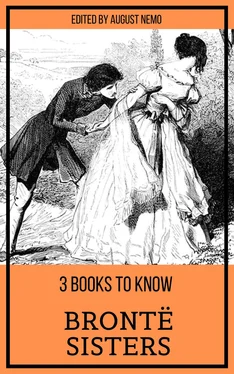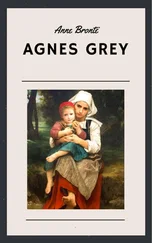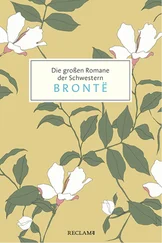‘However,’ thought I, ‘I ought not to marry Eliza, since my mother so strongly objects to it, and I ought not to delude the girl with the idea that I intended to do so. Now, if this mood continue, I shall have less difficulty in emancipating my affections from her soft yet unrelenting sway; and, though Mrs. Graham might be equally objectionable, I may be permitted, like the doctors, to cure a greater evil by a less, for I shall not fall seriously in love with the young widow, I think, nor she with me—that’s certain—but if I find a little pleasure in her society I may surely be allowed to seek it; and if the star of her divinity be bright enough to dim the lustre of Eliza’s, so much the better, but I scarcely can think it.’
And thereafter I seldom suffered a fine day to pass without paying a visit to Wildfell about the time my new acquaintance usually left her hermitage; but so frequently was I baulked in my expectations of another interview, so changeable was she in her times of coming forth and in her places of resort, so transient were the occasional glimpses I was able to obtain, that I felt half inclined to think she took as much pains to avoid my company as I to seek hers; but this was too disagreeable a supposition to be entertained a moment after it could conveniently be dismissed.
One calm, clear afternoon, however, in March, as I was superintending the rolling of the meadow-land, and the repairing of a hedge in the valley, I saw Mrs. Graham down by the brook, with a sketch-book in her hand, absorbed in the exercise of her favourite art, while Arthur was putting on the time with constructing dams and breakwaters in the shallow, stony stream. I was rather in want of amusement, and so rare an opportunity was not to be neglected; so, leaving both meadow and hedge, I quickly repaired to the spot, but not before Sancho, who, immediately upon perceiving his young friend, scoured at full gallop the intervening space, and pounced upon him with an impetuous mirth that precipitated the child almost into the middle of the beck; but, happily, the stones preserved him from any serious wetting, while their smoothness prevented his being too much hurt to laugh at the untoward event.
Mrs. Graham was studying the distinctive characters of the different varieties of trees in their winter nakedness, and copying, with a spirited, though delicate touch, their various ramifications. She did not talk much, but I stood and watched the progress of her pencil: it was a pleasure to behold it so dexterously guided by those fair and graceful fingers. But ere long their dexterity became impaired, they began to hesitate, to tremble slightly, and make false strokes, and then suddenly came to a pause, while their owner laughingly raised her face to mine, and told me that her sketch did not profit by my superintendence.
‘Then,’ said I, ‘I’ll talk to Arthur till you’ve done.’
‘I should like to have a ride, Mr. Markham, if mamma will let me,’ said the child.
‘What on, my boy?’
‘I think there’s a horse in that field,’ replied he, pointing to where the strong black mare was pulling the roller.
‘No, no, Arthur; it’s too far,’ objected his mother.
But I promised to bring him safe back after a turn or two up and down the meadow; and when she looked at his eager face she smiled and let him go. It was the first time she had even allowed me to take him so much as half a field’s length from her side.
Enthroned upon his monstrous steed, and solemnly proceeding up and down the wide, steep field, he looked the very incarnation of quiet, gleeful satisfaction and delight. The rolling, however, was soon completed; but when I dismounted the gallant horseman, and restored him to his mother, she seemed rather displeased at my keeping him so long. She had shut up her sketch-book, and been, probably, for some minutes impatiently waiting his return.
It was now high time to go home, she said, and would have bid me good-evening, but I was not going to leave her yet: I accompanied her half-way up the hill. She became more sociable, and I was beginning to be very happy; but, on coming within sight of the grim old hall, she stood still, and turned towards me while she spoke, as if expecting I should go no further, that the conversation would end here, and I should now take leave and depart—as, indeed, it was time to do, for ‘the clear, cold eve’ was fast ‘declining,’ the sun had set, and the gibbous moon was visibly brightening in the pale grey sky; but a feeling almost of compassion riveted me to the spot. It seemed hard to leave her to such a lonely, comfortless home. I looked up at it. Silent and grim it frowned before us. A faint, red light was gleaming from the lower windows of one wing, but all the other windows were in darkness, and many exhibited their black, cavernous gulfs, entirely destitute of glazing or framework.
‘Do you not find it a desolate place to live in?’ said I, after a moment of silent contemplation.
‘I do, sometimes,’ replied she. ‘On winter evenings, when Arthur is in bed, and I am sitting there alone, hearing the bleak wind moaning round me and howling through the ruinous old chambers, no books or occupations can repress the dismal thoughts and apprehensions that come crowding in—but it is folly to give way to such weakness, I know. If Rachel is satisfied with such a life, why should not I?—Indeed, I cannot be too thankful for such an asylum, while it is left me.’
The closing sentence was uttered in an under-tone, as if spoken rather to herself than to me. She then bid me good-evening and withdrew.
I had not proceeded many steps on my way homewards when I perceived Mr. Lawrence, on his pretty grey pony, coming up the rugged lane that crossed over the hill-top. I went a little out of my way to speak to him; for we had not met for some time.
‘Was that Mrs. Graham you were speaking to just now?’ said he, after the first few words of greeting had passed between us.
‘Yes.’
‘Humph! I thought so.’ He looked contemplatively at his horse’s mane, as if he had some serious cause of dissatisfaction with it, or something else.
‘Well! what then?’
‘Oh, nothing!’ replied he. ‘Only I thought you disliked her,’ he quietly added, curling his classic lip with a slightly sarcastic smile.
‘Suppose I did; mayn’t a man change his mind on further acquaintance?’
‘Yes, of course,’ returned he, nicely reducing an entanglement in the pony’s redundant hoary mane. Then suddenly turning to me, and fixing his shy, hazel eyes upon me with a steady penetrating gaze, he added, ‘Then you have changed your mind?’
‘I can’t say that I have exactly. No; I think I hold the same opinion respecting her as before—but slightly ameliorated.’
‘Oh!’ He looked round for something else to talk about; and glancing up at the moon, made some remark upon the beauty of the evening, which I did not answer, as being irrelevant to the subject.
‘Lawrence,’ said I, calmly looking him in the face, ‘are you in love with Mrs. Graham?’
Instead of his being deeply offended at this, as I more than half expected he would, the first start of surprise, at the audacious question, was followed by a tittering laugh, as if he was highly amused at the idea.
‘I in love with her!’ repeated he. ‘What makes you dream of such a thing?’
‘From the interest you take in the progress of my acquaintance with the lady, and the changes of my opinion concerning her, I thought you might be jealous.’
He laughed again. ‘Jealous! no. But I thought you were going to marry Eliza Millward.’
‘You thought wrong, then; I am not going to marry either one or the other—that I know of—’
‘Then I think you’d better let them alone.’
Читать дальше











